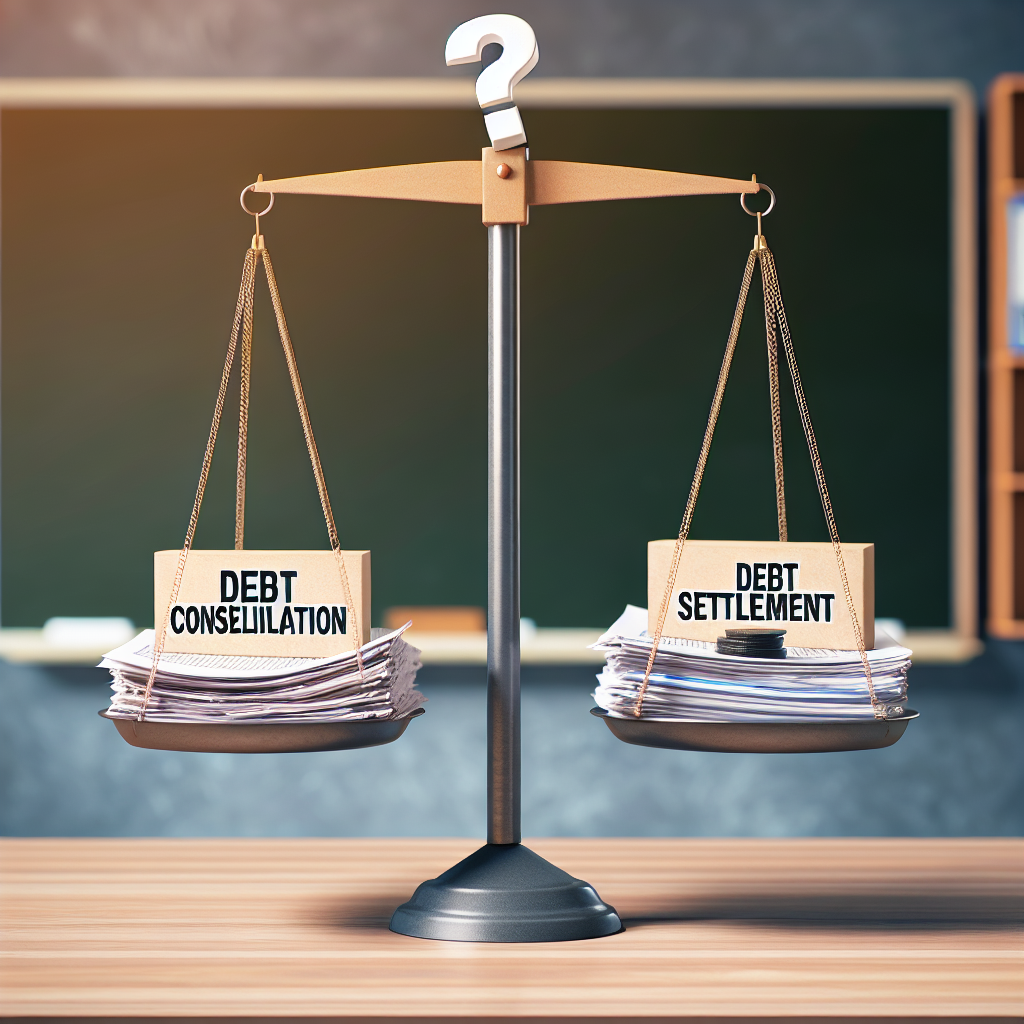Managing debt can be one of life’s most challenging experiences. If you’re feeling overwhelmed by your financial obligations, you might have come across two popular options: debt consolidation and debt settlement. While both methods aim to provide relief from debt, they are fundamentally different approaches. In this article, we’ll delve into the intricacies of both options, helping you make an informed decision about which is better suited for your financial situation.
What is Debt Consolidation?
Debt consolidation involves combining multiple debts into a single loan, typically with a lower interest rate. Many individuals opt for this route to simplify their payments and reduce the amount of interest they pay over time. Here are some key aspects to consider:
How Debt Consolidation Works
- Taking Out a New Loan: Borrowers often take out a personal loan or use a balance transfer credit card to pay off their existing debts.
- Single Monthly Payment: By consolidating debts, individuals simplify their financial obligations to one manageable monthly payment.
- Lower Interest Rates: If you have good credit, you may qualify for a loan with a lower interest rate, ultimately saving money.
Pros of Debt Consolidation
- Simplifies Payments: Managing one payment is easier than juggling multiple debts.
- Potential Cost Savings: Lower interest rates can lead to overall savings.
- Improves Credit Score: Paying off existing debts can positively impact your credit score.
Cons of Debt Consolidation
- Risk of Accumulating More Debt: If not managed properly, individuals may accrue more debt while still owing on the consolidated loan.
- Fees and Expenses: Some loans come with fees that can offset savings.
- Eligibility Requirements: Good credit is often necessary to secure a favorable rate.
What is Debt Settlement?
Debt settlement, on the other hand, involves negotiating with creditors to settle debts for less than the full amount owed. This option can be particularly appealing for those in serious financial distress. Let’s explore how it works:
How Debt Settlement Works
- Negotiation: Debt settlement companies negotiate with creditors on your behalf to reduce your debt.
- Lump-Sum Payment: Typically, the final amount is paid as a lump sum, which is often less than what you originally owed.
- Potential Impact on Credit: While settled debts are marked as "settled" rather than "paid in full," this can negatively affect your credit score.
Pros of Debt Settlement
- Reduced Debt Amount: You might pay significantly less than what you owe.
- Faster Resolution: Settlement can potentially resolve your debt issues in a shorter time frame.
- No New Loans Required: Unlike consolidation, you don’t need to take out additional loans.
Cons of Debt Settlement
- Impact on Credit Score: Settling debts can lower your credit score.
- Tax Implications: The IRS may consider forgiven debt as taxable income.
- Increased Collection Calls: During negotiations, creditors may increase collection efforts.
Key Differences Between Debt Consolidation and Debt Settlement
Understanding the differences between these two options is crucial for individuals in debt. Here are the primary distinctions:
Nature of Approach
- Debt Consolidation: Involves combining debts into one payment.
- Debt Settlement: Focuses on negotiating a lower total payment.
Credit Impact
- Debt Consolidation: Can improve your credit score if managed well.
- Debt Settlement: Generally has a negative impact on your credit score.
Payment Structure
- Debt Consolidation: Requires taking on a new loan to pay off existing debts.
- Debt Settlement: Settles debts for less than the full amount owed.
Eligibility Criteria
- Debt Consolidation: Generally requires good credit for favorable terms.
- Debt Settlement: Often available for those with significant debt trouble, regardless of credit standing.
Which Option Is Right for You?
Choosing between debt consolidation and debt settlement depends on your unique financial circumstances. Here are some questions to consider:
- What is the Total Amount of Debt?: If you have a manageable amount of debt with high interest rates, consolidation may be the way to go.
- What is Your Credit Score?: Good credit may favor consolidation, while poorer credit may necessitate seeking settlement.
- How Urgent is Your Situation?: For those facing immediate financial hardships, debt settlement may alleviate stress more quickly.
Conclusion
Understanding the differences between debt consolidation and debt settlement is vital in your journey towards financial recovery. While both options can provide relief, they cater to different needs and situations. By carefully assessing your financial situation, you can choose the path that best aligns with your goals, ultimately paving the way for a debt-free future. Whether you opt for debt consolidation or debt settlement, seeking advice from financial professionals can also provide guidance tailored to your individual circumstances.

